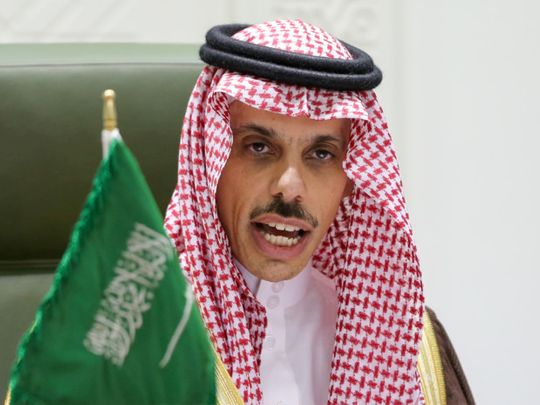
Dubai: Saudi Arabia’s foreign minister said the kingdom does not plan to engage with the Lebanese government at this time in a deepening rift, reiterating a call on the political class to end the “domination” of the Iran-allied Hezbollah movement.
Lebanon is facing its worst diplomatic crisis yet with Gulf states, spurred by a minister’s critical comments about the Saudi-led intervention in Yemen that prompted Riyadh to expel Lebanon’s ambassador, recall its own envoy and ban all imports from Lebanon.
“We see no useful purpose of engaging with the Lebanese government at this point in time,” Foreign Minister Prince Faisal bin Farhan Al Saud told France 24 television in an interview aired on Saturday.
“We think that the political class needs to step up and take the necessary actions to liberate Lebanon from the domination of Hezbollah, and through Hezbollah, Iran.” Saudi Arabia was angered by an interview in which Lebanon’s newly appointed information minister George Kordahi appeared to side with Yemen’s Iran-aligned Al Houthis and said Yemen was being subjected to external aggression.
Kordahi said the interview was recorded before he became a minister and has refused to apologise or step down.
Riyadh has said its actions were driven not just by Kordahi’s comments, made before the cabinet formation, but rather its objection to the growing heft of Hezbollah in Lebanese politics.
Lebanon has been going through an unprecedented financial crisis with the local currency depreciating by over 90 per cent, limiting people’s ability to afford their basic needs.
The country’s social stability started deteriorating since the October 2019 uprising, adding to it is the economic impact of COVID-19 and the deadly Port of Beirut explosions in August 2020.
Moreover, the failure to form an effective government to implement much-needed financial reforms accelerated the deterioration of the socioeconomic situation by resulting in the collapse of the Lebanese pound and an increase in annual inflation by 158 per cent with food inflation going up by 550 per cent.
The country’s poverty rate is currently hovering over 78 per cent.








